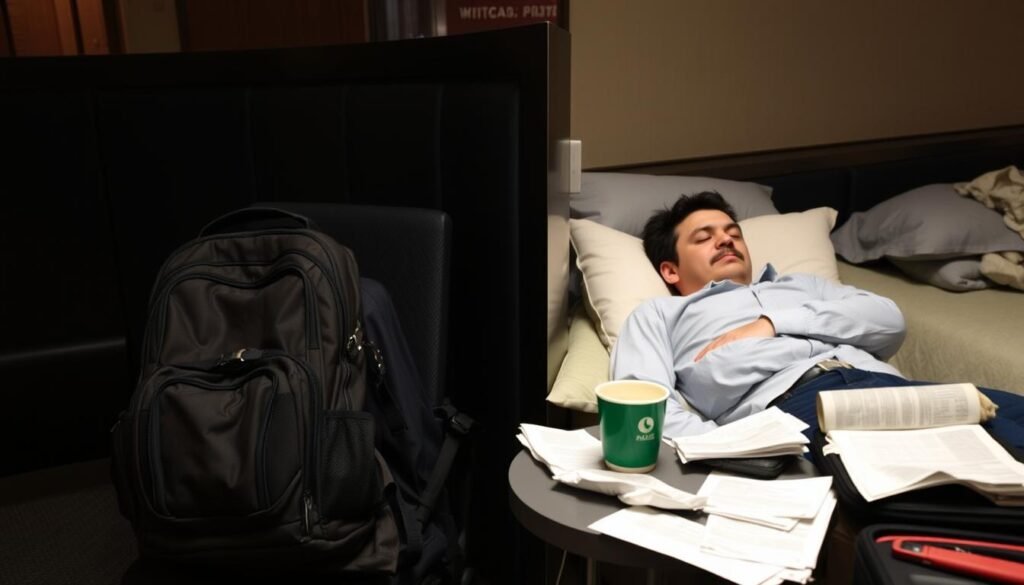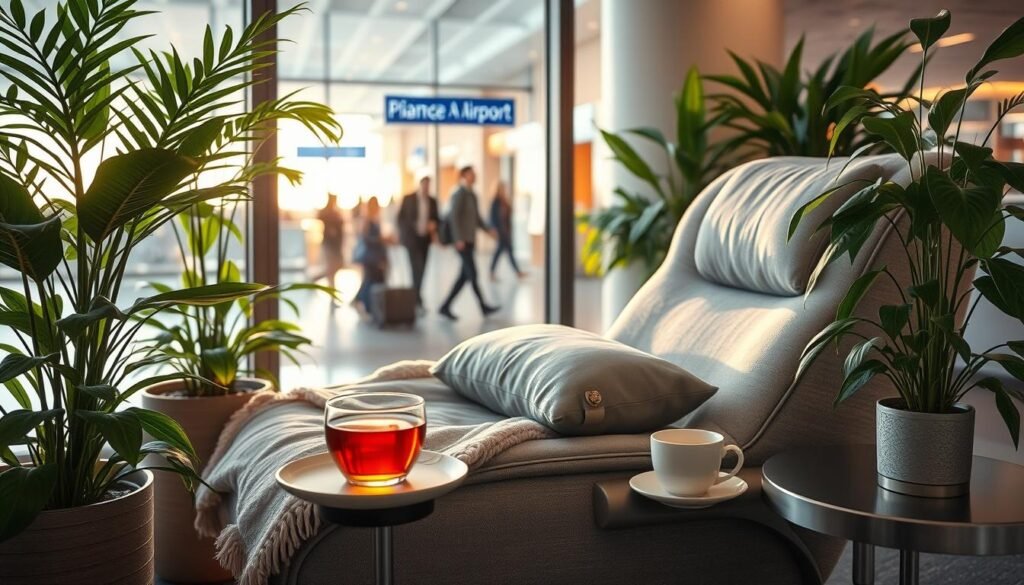Did you know traveling can make you 100 times more likely to fall ill? This happens because travel fatigue weakens your immune system. It affects millions, making them feel tired, stressed, and disinterested in exploring. Learning the duration of travel fatigue and ways to recover is crucial for anyone who loves to travel. This guide will explain the causes, symptoms, and steps to beat post-trip tiredness, helping you make the most of your journeys.
Key Takeaways
- Travel fatigue can be significantly heightened by long journeys, such as flights or extended road trips.
- Factors such as hydration, sleep, and diet play crucial roles in recovery from travel fatigue.
- Jet lag is a common symptom resulting from rapid time zone changes that disrupt sleep patterns.
- Listening to one’s body and prioritizing self-care are effective strategies for managing travel exhaustion.
- Maintaining a balanced diet during travel can help sustain energy and reduce fatigue.
- Consistent habits like adjusting sleep schedules before travel can minimize the impact of fatigue.
Understanding Travel Fatigue
Travel fatigue makes you feel tired and without energy after trips. It comes from messed-up sleep, new routines, and stress from traveling. The causes of travel fatigue can be busy schedules or changing time zones. A study found 26.8% of U.S. adults feel travel fatigue, showing it’s important for health.
The effects of travel on health include feeling irritable, mood changes, and not well overall. People might feel tired even after sleeping well, get sick easily, and feel burned out from traveling a lot. Addressing travel fatigue can make a big difference in how you feel.
Changes in altitude and sitting too long on trips cause travel fatigue. This can make you dehydrated and upset your stomach. On road trips, the stop-and-go can also make you feel tired.
To better deal with these problems, learn some tips and natural remedies to help. Check this useful resource to support your health on the road.
What Causes Jet Lag?
Jet lag happens when our internal clock gets out of sync. This is due to traveling across multiple time zones. It makes us feel tired during the day, unable to sleep at night, and can even change our mood. When we cross three or more time zones, these feelings get stronger.
- The direction of travel: Eastward flights often result in more severe symptoms.
- The number of time zones crossed: Traveling further yields greater disruptions.
- Individual sleep habits: Those with consistent sleep patterns may cope better.
About 75% of travelers find heading east tougher than going west. This is because symptoms are more intense when crossing many time zones. Some might not notice jet lag much. But people who fly often, like pilots and flight attendants, might have frequent problems. They deal with internal clock disruption a lot.
Knowing the different causes of jet lag and how they mix can help. It aids in creating good plans to lessen symptoms. And it helps us get used to new time zones better.
How Long Can Travel Fatigue Last
Travel fatigue can disrupt both body and mind for travelers. Knowing how long this fatigue lasts is crucial, mainly regarding jet lag. Several factors play a role, like the number of time zones crossed and personal health. Travel fatigue duration is linked with jet lag, affecting enjoyment and recovery time.
Typical Duration of Jet Lag
The length of jet lag depends on the time zones crossed. Studies show that the body adjusts by about one day per time zone. For example, crossing four time zones might mean four days of jet lag. These days can be filled with tiredness, discomfort, and feeling out of place, which can ruin travel fun.
Impact of Time Zones on Recovery
Recovery from travel fatigue is influenced by the direction of travel. Eastward trips are tougher than westward ones due to our natural sleep cycles. Going east can make adjusting hard, extending jet lag. Adjusting to the local day and night schedule quickly is key to reducing jet lag. Getting natural sunlight helps with faster adjustment to new time zones.
Symptoms of Travel Fatigue
Traveling is fun, but it has its tough sides too. Knowing how travel fatigue feels is key for a quick recovery. There are many things that can make you feel worn out from travel. They show up in different signs you should watch for.
Common Signs of Jet Lag
Jet lag makes traveling hard. You might feel:
- Fatigue and tiredness
- Insomnia or disrupted sleep patterns
- Mood fluctuations and irritability
- Physical discomfort such as headaches
- Digestive issues like bloating and constipation
- Impaired cognitive function, affecting concentration and decision-making
Knowing these signs helps you spot more than just being tired. Ignoring them can make getting back on track harder and ruin your trip.
Identifying Travel Exhaustion
Travel exhaustion can come from any trip, by plane, train, or car. You might notice:
- Excessive tiredness that sleep doesn’t help
- A weaker immune system, making you get sick easier
- Feeling stressed or totally burnt out
- Bad eating habits on the road, usually eating junk food
Notice these travel fatigue signs so you can care for yourself. It’s important to listen to your body. Simple things like drinking water and getting used to new time zones can make traveling smoother.

| Travel Method | Common Symptoms of Travel Fatigue | Recommended Solutions |
|---|---|---|
| Air Travel | Altitude adjustments, dehydration, bloating | Stay hydrated, move around during the flight |
| Road Trips | Acceleration-related stress, exhaustion | Take frequent breaks, practice deep breathing |
| Train Travel | Disrupted sleep, fatigue from constant motion | Use eye masks, listen to calming music |
Factors Affecting Recovery Time
Recovery time from travel fatigue varies greatly. It depends on many things. One key factor is age. Older people might find it harder to adjust their body clocks. This makes their recovery from travel fatigue longer than younger people’s.
Travel direction also matters a lot. Going west usually causes less jet lag than flying east. This has a big effect on how long jet lag lasts. For instance, your body needs about a day to adjust for each time zone you cross.
What you do before your trip impacts recovery too. Poor sleep and high stress before traveling can make jet lag worse. They lead to feeling tired, trouble sleeping, and not wanting to eat.
- Travel disruptions: Busy schedules and lack of sleep make recovery slow.
- Travel methods: Car trips might worsen travel fatigue due to stops and movement.
- Environmental factors: Different lighting can change how your body clock adjusts.
Understanding these factors helps travelers. They can plan better and reduce fatigue during and after their trips.
Effective Strategies for Recovery
Traveling a lot can be hard on your health. To fight travel tiredness, it’s important to follow some key recovery strategies. Making sure you drink enough water and get plenty of sleep are top priorities. This keeps your energy up and helps your body heal naturally.
Importance of Hydration
It’s very important to stay hydrated while traveling. Not drinking enough water can make you feel more tired. It can also stop your body from recovering well. Try to drink lots of water before, during, and after your flights. Adding electrolytes to your drinks can also help keep you properly hydrated. Pay attention to what your body needs to recover effectively.
Adjusting Sleep Schedules
Changing your sleep schedule before a trip can help. It gets your body used to a new time zone quicker. This means you’ll have less jet lag and feel less tired from traveling. Trying things like taking melatonin supplements or doing guided meditation can also make your sleep better. When companies allow flexible travel plans that include rest time, it really helps employees recover faster.

Tips for Preventing Jet Lag Symptoms
Traveling across time zones can disturb our natural body clock, leading to jet lag. But, there are ways to reduce these issues with good planning and wellness habits. By following tips for travel preparation, you can greatly enhance your trip and overall travel wellness.
Preparing Before Travel
- Start adjusting your sleep schedule a few days before you leave. This helps your body get ready.
- Eat smaller meals before your trip to prevent stomach problems that can make jet lag worse.
- Do physical activities to improve your energy and prepare for the travel.
- Avoid alcohol since it can make you dehydrated and worsen your sleep during the trip.
During Travel Wellness Practices
Keeping an eye on your health while traveling is key in preventing jet lag symptoms. Here are some good practices:
- Keep yourself hydrated by drinking lots of water throughout your flight.
- Walk around the aisle from time to time to help your blood flow and reduce tiredness.
- Try relaxing methods like deep breathing or meditation to stay calm.
- Bring things like a comfy travel pillow to sleep better on the flight.
Managing Travel-Related Tiredness
Travel can be exciting but also very tiring. This results in a fatigue known as travel fatigue. It impacts not only those who fly often but anyone on long trips. The key to beating this feeling is self-care.
Good self-care practices on the road help recharge your energy. They keep you feeling good throughout your journey. To really enjoy traveling, managing fatigue with self-care is crucial.
Self-Care Techniques
It’s important to use self-care to fight travel tiredness. A few simple actions can make recovery smoother. Plus, they make your trip more fun.
- Prioritize Sleep: Focus on getting good sleep both while traveling and afterward.
- Stay Hydrated: Drinking enough water is key since being dehydrated can make you more tired.
- Eat Nutritiously: Eating well helps keep your energy up and fight off tiredness.
- Plan Recovery Time: Having a day to relax after a trip helps get back to your usual pace.
Mindfulness and Relaxation
Mindfulness is great for easing stress on trips. Practices like meditation and stretching can be done anywhere. They help you stay calm and clear-minded.
Taking deep breaths lets you tune in to your body. This can lessen the feeling of being tired. Having a simple mindfulness routine for travel ensures self-care stays a top priority.

Overcoming Post-Trip Fatigue
It’s common for travelers to feel tired after a trip, with up to 60% feeling exhausted. Effective recovery steps are essential for feeling better. Planning recovery time right after your trip is key. It helps you get back to your daily life smoothly. Allowing a day or two for this can really help with post-trip fatigue recovery.
Scheduling Recovery Time
Scheduling days to recover after a trip is crucial. It minimizes fatigue. Studies show that 90% of travelers who take time to settle back in home life feel ready to tackle their daily routines. Making sure your home is tidy before you leave makes coming back less stressful. As many as 75% of people find it easier to relax in a clean space.
Adjusting to Home Life After Travel
Getting back into your usual routine at home can be smoother by easing into sleep and eating schedules. Adjusting your sleep and meal times before you come home can reduce jet lag. Also, practicing self-care while you’re away helps maintain your energy. This includes staying hydrated, eating well, and exercising regularly. Choosing quality experiences over doing too much can also prevent feeling burnout, making for a refreshing return.
| Recovery Strategy | Effectiveness (%) |
|---|---|
| Scheduling recovery days | 90 |
| Cleansing home environment before travel | 75 |
| Practicing self-care during travel | 80 |
| Natural light exposure | 85 |
Bouncing Back from Long-Haul Flights
Recovering from long-haul flights needs a smart plan to feel energetic and well again. It’s key to drink lots of water after a flight. This helps fight off the dryness from the plane. Also, doing light exercises like a slow walk boosts your blood flow. This helps you recover quicker.
Eating meals full of nutrients is also important. Foods like vegetables, lean meats, and grains raise your energy and support your health. Foods that have lots of antioxidants help boost your immune system. This is especially good for those feeling jet-lagged.
Getting enough sleep is crucial. Try to adjust your sleep schedule before you leave to make time zone changes easier. Melatonin supplements, in doses from 0.5 to 5 mg, may help combat jet lag.
Using a light box can also be effective. Try it for as many days as the time zones you crossed to lessen jet lag symptoms. These steps help your body adjust quicker, aiding in a smoother recovery.
Staying flexible with exercises is good too. Doing stretches regularly can lower fatigue. This makes it easier to bounce back from long flights. To learn more about flexibility’s benefits, check out this detailed guide.
| Recovery Strategy | Benefits |
|---|---|
| Hydration | Combats dehydration and improves overall energy |
| Nutrient-Rich Meals | Supports immune function and restores energy |
| Light Physical Activity | Stimulates circulation and enhances mood |
| Sleep Adjustment | Helps align body clock with local time |
| Melatonin Supplements | Reduces jet lag symptoms effectively |
To get back on track after a long flight, these strategies are key. It’s important to pay attention to what your body needs. Listening to yourself is vital in recovering well.
Coping with Travel Burnout
Travel burnout can show up in many ways. It often leaves you feeling tired and disconnected after a long trip. Knowing the signs is key to getting better. You might feel very tired, easily annoyed, not willing to do much, and find it hard to focus. When these feelings strike, you may feel lost and out of touch with what’s around you.
Recognizing Burnout Symptoms
It’s crucial to understand the symptoms of travel burnout. They can be physical, emotional, or mental. Here are some common ones:
- Constant tiredness
- Lack of motivation
- Irritability
- Difficulty concentrating
- A sense of being overwhelmed
Being aware of these signs helps travelers accept their feelings. Then, they can start taking steps toward feeling balanced after a trip.
Re-establishing Routine
After spotting the signs of burnout, it’s good to create a regular routine. A steady daily plan helps bring back normalcy. Adding self-care, like hobbies, exercise, or hanging out with friends, fights off tiredness. Staying hydrated and eating well tackles travel’s physical toll.
Taking breaks from traveling, doing what’s familiar, and resting are key to a healthier mindset. With these steps, you can slowly beat travel burnout and begin to enjoy traveling anew.
Beating Post-Vacation Fatigue
Many travelers deal with post-vacation fatigue after coming home. This tiredness often comes from the fun and changes in routine during the trip. Getting back into everyday life smoothly can help a lot.
Setting New Goals
After a trip, setting goals is a great way to beat post-vacation fatigue. Travel can inspire us to set new personal or professional goals. These goals can bring back motivation and give us a purpose.
It’s important to take small, achievable steps towards these goals. This makes the journey back to daily life both steady and exciting.
Finding Joy in Everyday Activities
Finding joy in daily life can help after a vacation. Try local activities or new recipes that remind you of your travels. Adding small adventures to your daily routine keeps the travel excitement alive.
By doing these fun activities, you can ease back into your routine. This also helps keep those vacation memories fresh, helping you overcome fatigue.
Conclusion
Understanding how travel fatigue affects health is very important for people who travel. Studies over 40 years have shown that not getting enough sleep makes jet lag worse. Knowing this helps travelers take steps to feel better after a trip. Adjusting sleep schedules to the new time zone can help manage travel tiredness well.
Travel fatigue makes you feel constantly tired and can change how you act, especially during long trips. Drinking water and resting enough can really make a difference in how you feel during and after your journey. Check out Sickday for plans to help with travel fatigue. For more tips and information, visit this resource.
Following these tips and taking care of your physical and emotional health can lessen the bad side of travel fatigue. With good planning and a smart recovery strategy, travel can still be a fun and rewarding experience.